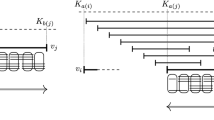Abstract
We consider the complexity of the Independent Set Reconfiguration problem under the Token Sliding rule. In this problem we are given two independent sets of a graph and are asked if we can transform one to the other by repeatedly exchanging a vertex that is currently in the set with one of its neighbors, while maintaining the set independent. Our main result is to show that this problem is PSPACE-complete on split graphs (and hence also on chordal graphs), thus resolving an open problem in this area. We then go on to consider the c-Colorable Reconfiguration problem under the same rule, where the constraint is now to maintain the set c-colorable at all times. As one may expect, a simple modification of our reduction shows that this more general problem is PSPACE-complete for all fixed c ≥ 1 on chordal graphs. Somewhat surprisingly, we show that the same cannot be said for split graphs: we give a polynomial time (nO(c)) algorithm for all fixed values of c, except c = 1, for which the problem is PSPACE-complete. We complement our algorithm with a lower bound showing that c-Colorable Reconfiguration is W[2]-hard on split graphs parameterized by c and the length of the solution, as well as a tight ETH-based lower bound for both parameters. Finally, we study c-Colorable Reconfiguration under a relaxed rule called Token Jumping, where exchanged vertices are not required to be adjacent. We show that the problem on chordal graphs is PSPACE-complete even if c is some fixed constant. We then show that the problem is polynomial-time solvable for strongly chordal graphs even if c is a part of the input.

Similar content being viewed by others
Notes
A path of five vertices is strongly chordal but not a split graph. The graph obtained from a triangle K3 by attaching to each edge a new vertex adjacent to both endpoints of the edge is a split graph but not strongly chordal.
References
Bonamy, M., Bousquet, N.: Token Sliding on Chordal Graphs. In: WG 2017, Volume 10520 of Lecture Notes in Computer Science, pp. 127–139 (2017)
Bonsma, P.S., Kaminski, M., Wrochna, M.: Reconfiguring Independent Sets in Claw-Free Graphs. In: SWAT, volume 8503 of Lecture Notes in Computer Science, pp. 86–97. Springer (2014)
Bousquet, N., Mary, A., Parreau, A.: Token Jumping in Minor-Closed Classes. In: FCT, volume 10472 of Lecture Notes in Computer Science, pp. 136–149. Springer (2017)
Cygan, M., Fomin, F.V., Kowalik, L., Lokshtanov, D., Marx, D., Pilipczuk, M., Pilipczuk, M., Saurabh, S.: Parameterized Algorithms. Springer, Berlin (2015)
Demaine, E.D., Demaine, M.L., Fox-epstein, E., Hoang, D.A., Ito, T., Ono, H., Otachi, Y., Uehara, R., Yamada, T.: Linear-time algorithm for sliding tokens on trees. Theor. Comput. Sci. 600, 132–142 (2015)
Fox-Epstein, E., Hoang, D.A., Otachi, Y., Uehara, R.: Sliding Token on Bipartite Permutation Graphs. In: ISAAC, volume 9472 of Lecture Notes in Computer Science, pp. 237–247. Springer (2015)
Hearn, R.A.: Games, puzzles, and computation. PhD Thesis, Massachusetts Institute of Technology, Cambridge (2006)
Hearn, R.A., Demaine, E.D.: PSPACE-completeness of sliding-block puzzles and other problems through the nondeterministic constraint logic model of computation. Theor. Comput. Sci. 343(1-2), 72–96 (2005)
Hearn, R.A., Demaine, E.D.: Games, puzzles and computation. AK Peters, Massachusetts (2009)
van den Heuvel, J.: The complexity of change. In: Blackburn, S.R., Gerke, S., Wildon, M. (eds.) Surveys in Combinatorics 2013, volume 409 of London Mathematical Society Lecture Note Series, pp 127–160. Cambridge University Press (2013)
Hoang, D.A., Uehara, R.: Sliding Tokens on a Cactus. In: ISAAC, volume 64 of LIPIcs, pp. 37:1–37:26. Schloss Dagstuhl - Leibniz-Zentrum fuer Informatik (2016)
Ito, T., Demaine, E.D., Harvey, N.J.A., Papadimitriou, C.H., Sideri, M., Uehara, R., Uno, Y.: On the complexity of reconfiguration problems. Theor. Comput. Sci. 412(12–14), 1054–1065 (2011)
Ito, T., Kaminski, M., Ono, H., Suzuki, A., Uehara, R., Yamanaka, K.: On the Parameterized Complexity for Token Jumping on Graphs. In: TAMC, volume 8402 of Lecture Notes in Computer Science, pp. 341–351. Springer (2014)
Ito, T., Kaminski, M.J., Ono, H.: Fixed-Parameter Tractability of Token Jumping on Planar Graphs. In: ISAAC, volume 8889 of Lecture Notes in Computer Science, pp. 208–219. Springer (2014)
Ito, T., Otachi, Y.: Reconfiguration of colorable sets in classes of perfect graphs. Theor. Comput. Sci. 772, 111–122 (2019)
Kamiński, M., Medvedev, P., Milanič, M.: Complexity of independent set reconfigurability problems. Theor. Comput. Sci. 439, 9–15 (2012)
Lokshtanov, D., Mouawad, A.E.: The complexity of independent set reconfiguration on bipartite graphs. In: SODA 2018, pp. 185–195 (2018)
Mouawad, A.E., Nishimura, N., Raman, V., Simjour, N., Suzuki, A.: On the parameterized complexity of reconfiguration problems. Algorithmica 78(1), 274–297 (2017)
Nishimura, N.: Introduction to reconfiguration. Algorithms 11(4), 52 (2018)
Papadimitriou, C.H.: Computational complexity. Addison-Wesley, Massachusetts (1994)
Saxe, J.B.: Dynamic-programming algorithms for recognizing small-bandwidth graphs in polynomial time. SIAM J. Matrix Anal. Appl. 1(4), 363–369 (1980)
West, D.B.: Introduction to graph theory, 2nd edn. Prentice Hall, Upper Saddle River (2001)
Wrochna, M.: Reconfiguration in bounded bandwidth and tree-depth. J. Comput. Syst. Sci. 93, 1–10 (2018)
Acknowledgments
Supported by JSPS and MAEDI under the Japan-France Integrated Action Program (SAKURA) Project GRAPA 38593YJ, by PRC CNRS JSPS 2019-2020 program, project PARAGA (Parameterized Approximation Graph Algorithms), by FMJH program PGMO and EDF via project 2016-1760H/C16/1507 “Stability versus Optimality in Dynamic Environment Algorithmics” and project “ESIGMA” (ANR-17-CE23-0010), and by JSPS KAKENHI Grant Numbers JP18K11157, JP18K11168, JP18K11169, JP18H04091.
A preliminary version appeared in the proceedings of the 36th International Symposium on Theoretical Aspects of Computer Science (STACS 2019), vol. 126 of Leibniz International Proceedings in Informatics, pp. 13:1–13:17, 2019.
Author information
Authors and Affiliations
Corresponding author
Additional information
Publisher’s Note
Springer Nature remains neutral with regard to jurisdictional claims in published maps and institutional affiliations.
This article belongs to the Topical Collection: Special Issue on Theoretical Aspects of Computer Science (2019)
Guest Editors: Rolf Niedermeier and Christophe Paul
Rights and permissions
About this article
Cite this article
Belmonte, R., Kim, E.J., Lampis, M. et al. Token Sliding on Split Graphs. Theory Comput Syst 65, 662–686 (2021). https://doi.org/10.1007/s00224-020-09967-8
Published:
Issue Date:
DOI: https://doi.org/10.1007/s00224-020-09967-8




